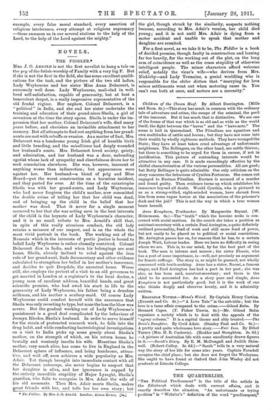Children of the Cloven Hoof. By Albert Dorrington. (Mills and
Boon. 6s.)—This story has much in common with the ordinary tale of adventure and crime, the escape of the criminal, the peril of the innocent. But it has much that is distinctive. We see one of the forms of that war which is as old and as wide as the world itself, the fight between the "haves" and the "have-note." The scene is laid in Queensland. The Fitzallans are squatters and own multitudes of cattle and horses ; but they have not come into their wealth by wholly righteous methods. They have wronged the State; they have at least taken cruel advantage of unfortunate neighbours. The Bellingers, on the other hand, are cattle thieves; but there is something to be urged for them in excuse, if not in justification. This picture of contending interests would be attractive in any case. It is made exceedingly effective by the skilful characterisation of the various personalities. All are good; but Betty Bellinger is quite admirable. Our only criticism on the story concerns the behaviour of Cynthia Fortescne. She comes out engaged to Eustace Fitzallan. Enstace is accused of a murder and found guilty. Then evidence turns up which establishes his innocence beyond all doubt. Would Cynthia, who is pictured to us as a strong-willed, right-minded woman, have shrunk from him from some vague horror at the associations of the prisoner's dock and the jail? This is not the way in which a true woman bears herself.






















































 Previous page
Previous page